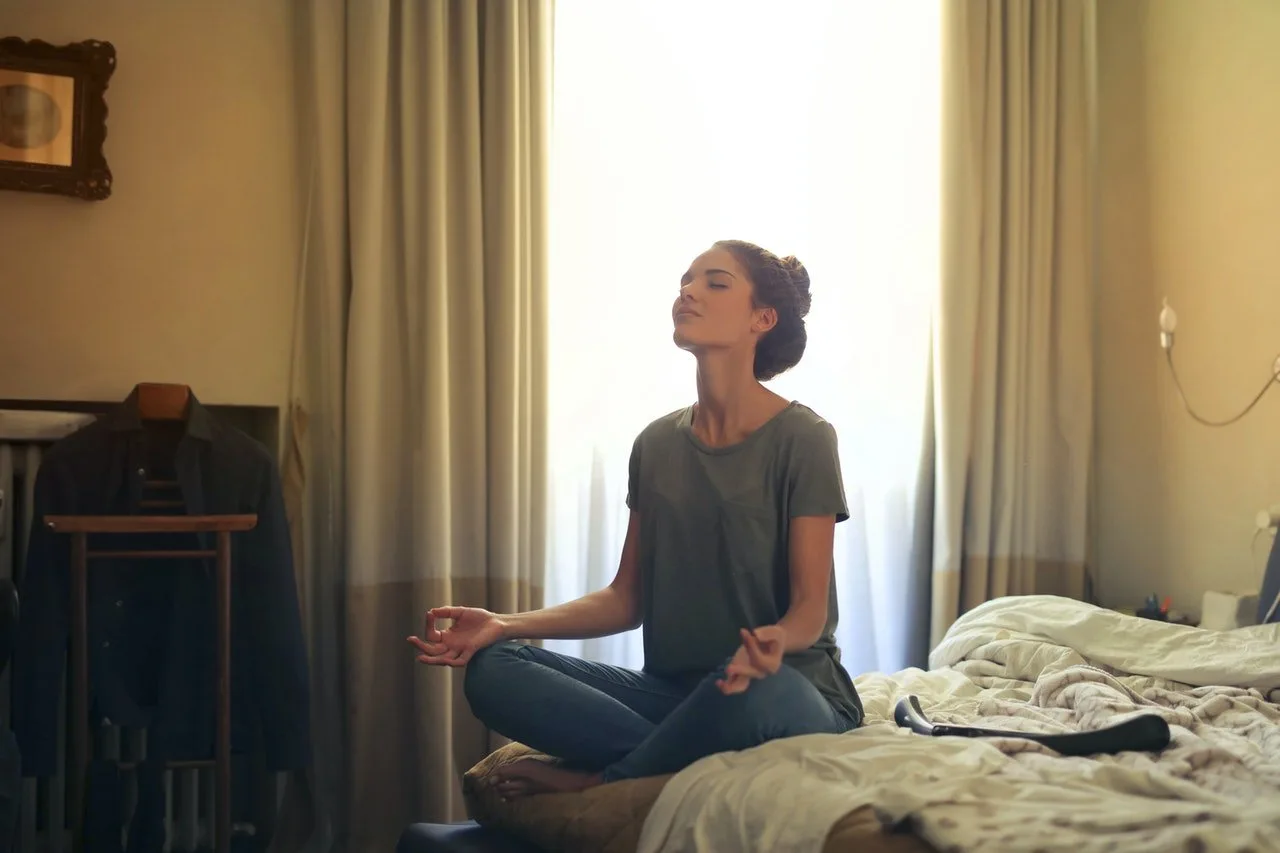The COVID-19 pandemic is stressful for everyone. We are worried about the well-being of ourselves and loved ones, our financial situation, and so much more. Under these circumstances, the levels of stress and anxiety keep rising. Even though it’s a serious problem, COVID is not an unbeatable enemy. There’s a lot we can do to fight against the novel coronavirus, and meditation could be one of them. Read on to see how.
Current research on meditation and COVID
As COVID-19 impacted every part of the world, scientists started working on the studies to uncover its mechanisms of action, potential treatment methods and to analyze its impact on psychological health and wellbeing. Current research on meditation and COVID revolves around its potential to alleviate stress and anxiety in these challenging times.
A paper from the Irish Journal of Psychological Medicine described the importance of meditation and mindfulness in the COVID-19 pandemic stating they can offer a helpful way to live with constant change. The pandemic has shown us that change is the only constant, and it can be difficult for people to cope with that.
Meditation practice could help, the paper states. For that reason, the author of the paper confirms meditation apps and online tutoring websites or classes should be recommended to patients. The practice of meditation can teach a person to cope with fears that are so common in the COVID-19 pandemic and help them understand these difficult times shall pass too.

Damian Lugowski/Shutterstock
The September 2020 issue of Frontiers in Psychology featured a study that identified mindfulness, age, and gender as factors that influence psychological distress in a pandemic. The reduced mindfulness stood out as the most important predictor of psychological distress that doesn’t allow individuals to manage stressful situations effectively.
At the same time, a study from the International Journal of Environmental Research and Public Health revealed mindfulness-based training could effectively mitigate the negative psychological consequences of COVID-19 and help restore wellbeing in vulnerable people. As you already know, the best way to practice mindfulness is through meditation.
Thanks to the importance of meditation for psychological wellbeing, many organizations and institutions have decided to include it in their coping strategies to help people overcome these difficult times.
How does meditation help?
The role of meditation in the fight against COVID-19 is important for more reasons than one, and it may go beyond psychological benefits. Below, we’re going to elaborate on some useful benefits through which meditation can be helpful against this virus.
Stronger immune system
A strong immune system is crucial for staying healthy in the COVID-19 pandemic or lessening the severity of the disease. What many people don’t know is that meditation can help strengthen the immune defenses.
A review of available evidence on this subject, published in the Annals of the New York Academy of Sciences, found the possible effects of meditation on specific markers of inflammation, cell-mediated immunity, and biological aging. For instance, countering a hypersensitive and dysregulated immune system with meditation could theoretically work to improve fitness through enhanced immune defenses that protect against viral and bacterial infections.
These immune defenses could offer protection against age-related diseases too. Moreover, meditation could downregulate the activity of major stress axes in the body, which are known for harming the immune system. Scientists concluded meditation could exhibit immune-boosting effects but emphasized the importance of further studies on this topic.
The journal Advances in Mind-Body Medicine featured a study that examined the influence of stress and meditation on our immunity and gut microbiota. They found that stress triggers a chain of reactions that disturb gut microbiota. In the absence of stress, microbiota in your gut produces short-chain fatty acids with anti-inflammatory and antitumor properties. Meditation can regulate the stress response and thereby suppress chronic inflammation and maintain healthy gut function.
Through its stress-relieving properties, meditation could decrease inflammation, improve gut health and thereby strengthen the immune system. Keep in mind that 70% to 80% of the immune system resides in your gut. Optimal gut function is crucial for your immune defenses.
Better sleep quality
Getting enough good night’s rest can help the immune system function more effectively. A study from the Journal of Experimental Medicine found sleep could influence immune defenses through T cells. In a nutshell, T cells are a type of immune cells that fight against pathogens.

wavebreakmedia/shutterstock
The study showed stress hormones adrenaline and noradrenaline, along with pro-inflammatory molecules called prostaglandins, inhibit the stickiness of integrins, a class of adhesion molecules. Since the concentration of stress hormones and prostaglandins is low during sleep, the adhesiveness of integrins is stronger. This matters because T cells need close and strong contact with infected cells to kill them. Without integrins, that wouldn’t be possible. Therefore, a better quality of sleep strengthens the stickiness of integrins and helps T cells have closer contact with pathogens.
Additionally, lack of sleep can affect different parts of the immune system. When you don’t get enough sleep, the levels of pro-inflammatory cytokines can increase. According to the CDC, sleep loss is also associated with a higher risk of infection.
Reduced sleep quality
Problems with sleep are common in the time of the COVID-19 pandemic. The February 2021 issue of the Journal of Clinical Sleep Medicine published a study that revealed approximately 40% of people from general and health care populations experienced sleep difficulties during the pandemic. The prevalence of sleep problems was higher in people who were infected.
Since sleep quality has a positive impact on the immune system, it’s paramount to get enough good night’s rest. One way to improve the quality of sleep is through meditation. A study from the Annals of the New York Academy of Sciences confirmed mindfulness meditation could be an effective approach to resolving some aspects of sleep disturbance. Moreover, research from the JAMA Internal Medicine found meditation could help with sleep problems.
How can meditation guidance from an online tutoring website help you sleep better? According to the abovementioned study, meditation functions on arousal and neurocognitive processes that mediate the link between perception of stimuli and appraisal. You see, sleep difficulties tend to stem from automatic arousal, consequential distress, and dysfunctional cognitions.
Meditation has the potential to attenuate these automatic responses, and it can increase the relaxation response. It does so by elevating attentional factors that regulate the autonomic nervous system, alleviate mood disturbances, and decrease worry.
In a nutshell, lack of sleep harms immune system defenses. Meditation can help you sleep better, which leads to stronger immunity.
Better emotional health
Meditation can strengthen our body and mind to fight against COVID-19. Not only does it have a favorable influence on the immune system, but it also supports our emotional health. As seen at the beginning of this post, meditation can help us cope with this situation. After all, COVID-19 has changed our lives and the whole world as we know it. Nothing is the same as it was before, and the constant uncertainty over health and finances can lead to anxiety and depression. This can lead to unhealthy lifestyle choices such as alcohol consumption and also worsen chronic health conditions.
Anxiety and depression, among other emotional and mental health problems, can harm our approach to the pandemic. They can prevent us from functioning properly to protect ourselves and others. At the same time, they can also increase the severity and mortality of COVID-19. A study from the JAMA Network Open found that those with prior or current mental health problems had poorer outcomes when they were infected with COVID-19.
Meditation can help improve the way you cope with a crisis situation, such as this one. An improved approach can mean a lot in terms of your immune system, the decisions you make, and your overall perspective on life.
How to start meditating
The concept of meditation may seem tricky to most people, but it’s easier than you think. If you’re not sure how to start meditating, online tutoring is the best way to dip your toes into the waters of calmness and serenity that meditation provides.
Before you start meditating, it’s important to understand a few things. For example:
- You don’t need money or special equipment to meditate
- Try to meditate without expectations of how you will feel afterward
- Choose a time to meditate and stick to it
- Choose a specific place in your home where you will meditate
- Try to be as calm as possible, don’t move or fidget
- Consider meditation as part of your self-care strategy
- Focus on every breath you inhale and exhale
- Be realistic and acknowledge some days will be easier than others, but constant effort matters the most.
Conclusion
Meditation helps fight against COVID-19 in multiple ways. Not only does it strengthen our immune system, but it also works to improve quality and sleep. At the same time, meditation improves our mental and emotional health. All these aspects are necessary for the fight against COVID-19.
References
-
https://www.ncbi.nlm.nih.gov/pmc/articles/PMC7287297/
-
https://www.ncbi.nlm.nih.gov/pmc/articles/PMC7516078/
-
https://www.ncbi.nlm.nih.gov/pmc/articles/PMC7559290/
-
https://www.ncbi.nlm.nih.gov/pmc/articles/PMC4940234/
-
https://pubmed.ncbi.nlm.nih.gov/29306937/
-
https://pubmed.ncbi.nlm.nih.gov/18721321/
-
https://rupress.org/jem/article/216/3/517/120367/G-s-coupled-receptor-signaling-and-sleep-regulate
-
https://www.cdc.gov/niosh/work-hour-training-for-nurses/longhours/mod2/05.html
-
https://pubmed.ncbi.nlm.nih.gov/33108269/
-
https://pubmed.ncbi.nlm.nih.gov/30575050/
-
https://www.ncbi.nlm.nih.gov/pmc/articles/PMC4407465/
-
https://www.kff.org/coronavirus-covid-19/issue-brief/the-implications-of-covid-19-for-mental-health-and-substance-use/
-
https://jamanetwork.com/journals/jamanetworkopen/fullarticle/2771037





![women [longevity live]](https://longevitylive.com/wp-content/uploads/2020/01/photo-of-women-walking-down-the-street-1116984-100x100.jpg)










